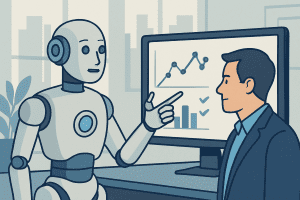May 1, 2025
I read a lot of articles because it’s not just new news that is interesting but also the trends that seem to be forming. So when I read this TechCrunch article about how Visa, Mastercard, and PayPal are launching AI agents that can shop and buy for you, I drew a very different conclusion.
Here’s a TL;DR on the article:
🔍 AI shopping agents can now act autonomously based on your preferences, budget, and style.
💳 They can complete transactions and suggest the best way to pay. 🛒 Mastercard even described a shopper whose agent curates, decides, and checks out—end to end.
That’s the story. But here’s the subtext:
🤖 When an AI is the buyer, brand equity means less than logic.
- It evaluates 50 products in milliseconds.
- It doesn’t “like” you.
- It doesn’t “feel loyal.”
- It chooses what best matches the input.
On the face of it, it seems like these AI buying agents will be super helpful. But here’s what could be the long-term result:
🤖 If AI agents can compare every option based on price, features, availability, and user preferences in milliseconds…
Then anything that can be commoditized will be.
Sidebar on the laws of underlying law of Economics
There isn’t a formal “law” in economics that’s universally named “anything that can be commoditized will be commoditized,” but the concept is well-rooted in economic theory and industry analysis. It reflects principles from:
🔹 Bertrand Competition (Pricing Pressure):
In markets with near-identical products and full transparency (e.g., AI agents comparing rates), price becomes the primary differentiator. This creates a race to the bottom—a hallmark of commoditization.
🔹 Porter’s Five Forces – Threat of Substitution & Competitive Rivalry:
When products lack differentiation and switching costs are low, commoditization becomes inevitable. Technology accelerates this by making comparison and substitution effortless.
🔹 Digitization & Frictionless Access:
Clayton Christensen and others in innovation theory have shown that as industries digitize, commoditization accelerates, especially for undifferentiated offerings.
Think about what that means for your product, your service, or your go-to-market:
✔️ Are you truly differentiated?
✔️ Are you the “agent’s” top pick—or just another interchangeable SKU?
This shift won’t just impact eCommerce. It’ll pressure:
- Lending rates and financial products
- How a consumer finds a realtor and a lender
- Any company coasting on brand inertia or average user experience
AI agents won’t just disrupt how we buy. They’ll reshape what survives being sold.
So What Should You Expect?
Here’s a realistic outlook on timing for this AI agent-driven commoditization trend to impact U.S. mortgage lenders—factoring in consumer behavior, tech maturity, and competitive adoption:
🕒 Short-Term (6–12 months): Early Signals and Edge Cases
- We’ll see early adopter consumers using personal AI agents (via OpenAI, Apple, or Amazon) to shop rates, compare lender reviews, and initiate applications.
- Lenders already integrated into price- and API-based ecosystems (like LendingTree, Zillow, or embedded finance apps) may see bot-initiated leads from intelligent agents.
- Forward-thinking POS/CRM vendors may begin piloting agent-friendly APIs to let AI act on behalf of consumers.
🕔 Mid-Term (12–24 months): Agent-Friendly Lenders Become Visible
- Consumer-facing AI tools will start favoring lenders with better data access, transparent pricing, and prefill-ready APIs.
- Mortgage-specific AI advisors (co-pilots for borrowers) will emerge, comparing not just rates but service, approval speed, and closing certainty.
- Lenders without agent-friendly infrastructure (e.g. prequal engines, docless underwriting, open disclosures) will get filtered out before the application is even started.
🕕 Long-Term (24–36 months): AI Agents Drive Mortgage Leads
- AI agents will become trusted proxies for borrowers—especially in refi or rate-shopping scenarios. “Hey AI, rates dropped, what’s my best option to refinance?”
- They’ll pick lenders the way travel agents pick airlines: on logic, not legacy. Think Kayak for mortgage.
- Pricing, terms, and automation will be commoditized, and lenders will need to differentiate on true execution quality, speed, or niche value.
🧭 Bottom Line for CIOs, CMOs, and CX Leaders:
If your mortgage pricing, qualification, or disclosures aren’t accessible via agent-friendly interfaces, you may soon be invisible to the digital “decision-makers” representing your future borrowers.
This shift won’t be dramatic—it will be silent and algorithmic.
And once the agents start comparing, only the best matches win.


